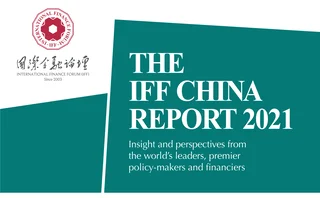
Further and faster


T he capital market is an important component of modern finance, and could cause a butterfly effect within the financial system. The 14th Five Year Plan (2021–25) for National Economic and Social Development and the Long-Range Objectives Through the Year 2035, approved at the Fifth Plenary Session of the 19th Central Committee of the Communist Party of China (CCCPC) in October 2020, proposed promoting the two-way opening-up of China’s financial sector, enhancing the improvement of a modern financial regulatory system, and strengthening the transparency and law-based management of financial supervision.
Currently, there are more than 4,000 listed companies in China’s capital market, with a market value of CNY80.08 trillion. China’s bond and stock market also ranks second globally, where it accommodates 170 million investors.

In 2020, amid the outbreak of the Covid-19 pandemic, a complex international situation and other major challenges, the China Securities Regulatory Commission (CSRC), under the leadership of the State Council of the People’s Republic of China’s Financial Stability and Development Committee (FSDC), strove to carry out pandemic prevention and control while further reforming and opening up the market. In this way, the CSRC effectively strengthened the capital market’s role as a hub, contributing to the recovery and growth of China’s real economy. It did so in the following ways.
First, through the registration-based initial public offering (IPO) system at its core, the CSRC implemented in-depth institutional reform and innovation in key areas of China’s capital market. The reform follows three principles: to respect the rules of the registration-based IPO system, to learn from international best practices and implement them in line with China’s characteristics and development stage, and to form a three-step road map from the Science and Technology Innovation Board (Star Market) and ChiNext to the whole market. This system marks a new chapter of furthering reform on all fronts.
Second, the CSRC has continued to promote and expand the two-way opening-up of the capital market in a stable and high-level manner. In the first half of 2020, foreign equity restrictions were cancelled ahead of schedule.
So far, several companies have been approved, including a wholly foreign-owned securities company, a fund company of China/foreign joint equity and eight wholly foreign-owned futures companies.
The CSRC has stepped up efforts to improve the framework of the IPO pilot programme for red-chip enterprises in China, and promoted more A-shares to be included in MSCI, FTSE, Standard & Poor’s, Dow Jones and other long-established indexes. It has also improved mechanisms within the Shanghai–Hong Kong Stock Connect and Shenzhen–Hong Kong Stock Connect programmes, and successfully implemented Shanghai–London Stock Connect and China–Japan ETF Connectivity, which strengthened international investors’ interest and confidence in China’s capital market. As a result, the proportion of foreign capitals’ shareholding continues to increase. Crude oil, iron ore, purified terephthalic acid and other futures have successively been introduced to foreign investors, while pulp futures became the first to go global with an authorised settlement price. China’s commodity futures market is also gaining increased influence in pricing and proportion in the global market.
Third, law-based construction has helped the CSRC achieve new success. The new Securities Law took effect in China on March 1, 2020, and Amendment XI to the Criminal Law was approved on December 24, 2020 and took effect on March 1, 2021. Legislation on futures has seen a breakthrough and is expected to be deliberated soon. The CSRC has been supportive of the Supreme People’s Court’s efforts to issue a judicial interpretation in securities class action, and move faster to amend judical interpretations around civil compensation liability of false statements in securities.
Order, order
The pandemic will have a lasting and complex impact on the political, economic and financial situation worldwide. Upholding principles of globalisation and multilateralism, the CSRC will continue to promote the opening-up of China’s capital market and enhance the fundamental institutional construction based on openness and co-operation.
According to the decisions and plans of the CCCPC and the State Council, the CSRC will take about two years to make breakthroughs within the legal system and improve law enforcement mechanisms. The result will be a more orderly capital market with heavier penalties for criminal activity and improved investor rights. Looking further into the future, the CSRC will build the legal system to be scientifically organised and well functioning. Once legislative changes have been made, China’s capital market will be built on a sound ecology with better law enforcement, transparency, openness, inclusiveness and credibility.
To help it achieve these goals, the CSRC has designed a road map based on five principles:
1. Improve the legal liability system. The CSRC will work with legislative bodies to push forward the amendments to China’s Criminal Law and formulate a futures law. It will also roll out regulation on the supervision of listed companies, privately offered investment funds and other actors to support the implementation of the Securities Law. The CSRC will, in addition, step up efforts to implement securities class action to enhance investor protection.
2. Build a stringent law enforcement system to combat illegal activities. According to the requirements of the 36th meeting of the FSDC, the CSRC will establish a working group to combat illegal activities in the capital market, and be more professional in securities law enforcement and jurisdiction, in collaboration with the Supreme People’s Court, the Supreme People’s Procuratorate, the Ministry of Public Security and other government bodies.
3. Enhance law enforcement in key areas and impose serious punishment on major securities crimes. The CSRC will uphold a zero-tolerance policy and adopt differentiated policies and comprehensive administrative measures, including administrative penalties, prohibiting access to the market and compulsory delisting, and form the all-rounded accountability system, including criminal penalties and civil compensations.
4. Conduct in-depth cross-border co-operation on supervision and law enforcement. The CSRC will spare no effort in preventing and holding firms accountable for violating the integrity of the market. At the same time, Chinese enterprises listed overseas must abide strictly by local laws and regulations, and fulfil information disclosure requirements. The CSRC has signed memorandums of understanding regarding regulatory co-operation with securities regulatory bodies in 65 jurisdictions, and signed the Multilateral memorandum of understanding concerning consultation and co‑operation and the exchange of information in 2007, fulfilling its obligation with regard to cross-border law enforcement in both bilateral and multilateral terms. Since 2020, the CSRC has provided assistance in 149 cross-border cases, including Hong Kong. In the future, the CSRC will develop more efficient ways of co-operating with international organisations, and explore the possibility of establishing an organisation for close and efficient co-operation on law enforcement against securities crimes.
5. Strengthening the credit system. The CSRC will add specific clauses on credit and integrity into related laws and regulation, and roll out a series of conditions of market access in this regard, including credit records, incentive for keeping faith and punishment for losing faith. In this way, China’s capital market will enjoy sound development with wide governance, joint construction and shared benefits.
To deal with the profound influence brought by the pandemic, in-depth and comprehensive international co-operation is a must, especially on securities supervision. The CSRC has been working hard to deepen reform and opening-up with its efforts to build China’s capital market with transparency, openness, energy and resilience. At the same time, the CSRC will learn from the experiences of overseas markets, and actively seek to co-operate with international regulatory agencies and international organisations, jointly contributing to the new round of growth of the world economy.
Only users who have a paid subscription or are part of a corporate subscription are able to print or copy content.
To access these options, along with all other subscription benefits, please contact info@centralbanking.com or view our subscription options here: subscriptions.centralbanking.com/subscribe
You are currently unable to print this content. Please contact info@centralbanking.com to find out more.
You are currently unable to copy this content. Please contact info@centralbanking.com to find out more.
Copyright Infopro Digital Limited. All rights reserved.
As outlined in our terms and conditions, https://www.infopro-digital.com/terms-and-conditions/subscriptions/ (point 2.4), printing is limited to a single copy.
If you would like to purchase additional rights please email info@centralbanking.com test test test
Copyright Infopro Digital Limited. All rights reserved.
You may share this content using our article tools. As outlined in our terms and conditions, https://www.infopro-digital.com/terms-and-conditions/subscriptions/ (clause 2.4), an Authorised User may only make one copy of the materials for their own personal use. You must also comply with the restrictions in clause 2.5.
If you would like to purchase additional rights please email info@centralbanking.com test test test







